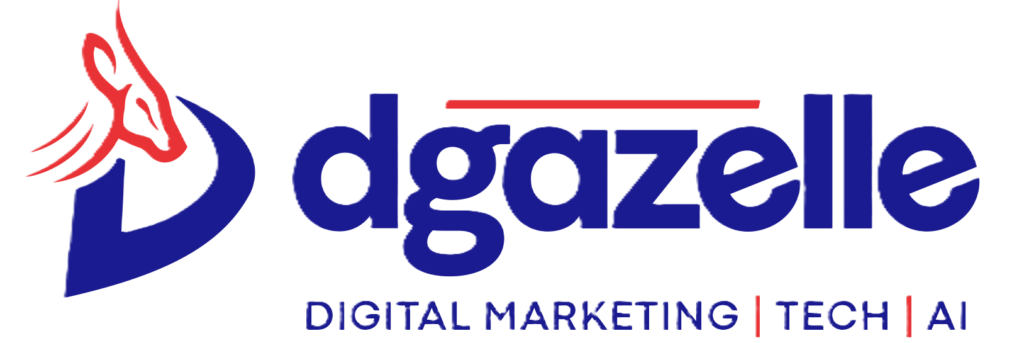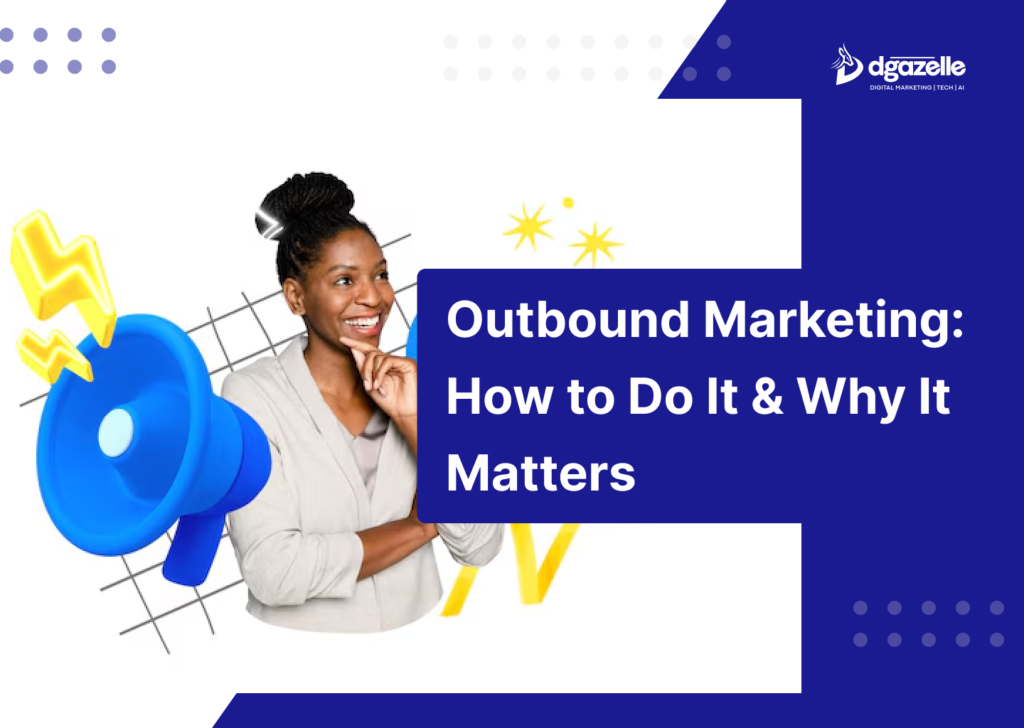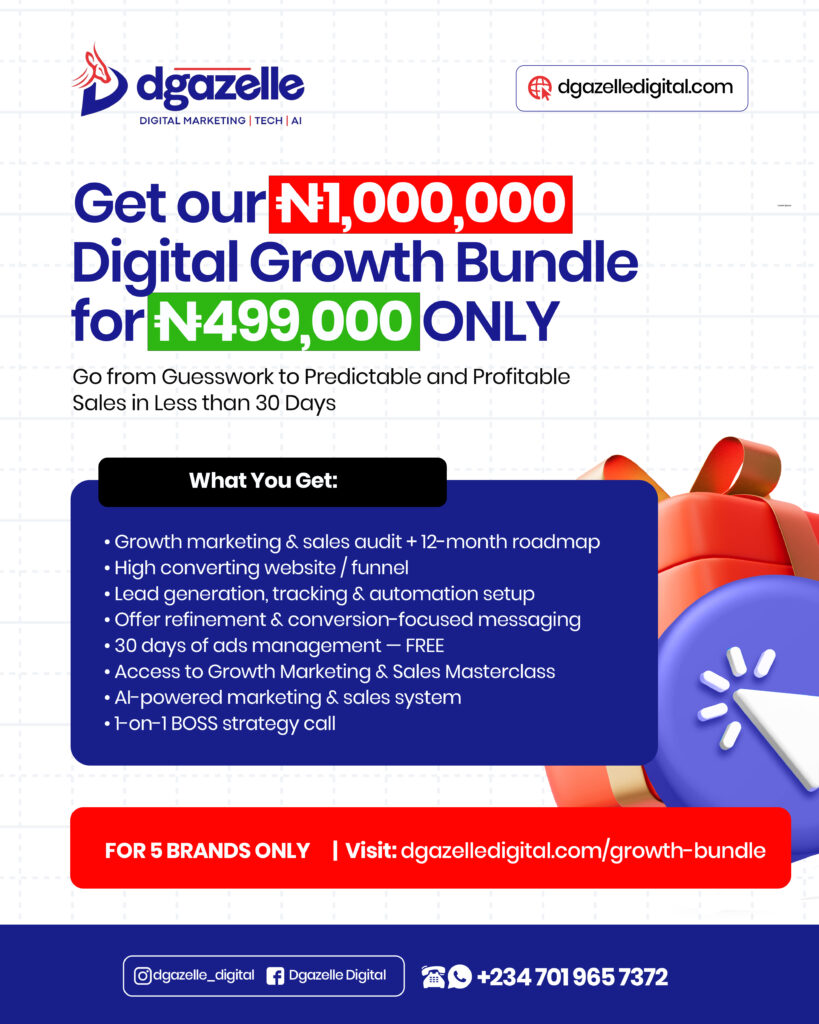Outbound marketing is a proactive strategy where businesses reach out to potential customers rather than waiting for them to discover their brand. This includes traditional methods like TV commercials, radio ads, cold calls, and billboards, as well as digital approaches such as email marketing, influencer collaborations, paid social media ads, and retargeting campaigns.
Unlike inbound marketing where customers find your business through content like blogs or SEO outbound marketing pushes your message to a broad audience, sometimes interrupting their daily activities. That’s why it’s often called “push marketing” or “interruption marketing.”
However, when done right, outbound marketing helps businesses build brand awareness, engage the right audience, and drive sales. The key is strategic execution choosing the right channels, refining your message, and ensuring your brand appears in front of the right people at the right time.
For Nigerian businesses, a well-crafted outbound marketing campaign, paired with a high-converting website can be a game changer. That’s where Dgazelle’s web design services come in. A well-optimized website makes your outbound efforts more effective by ensuring your ads drive traffic to a professional, high-performing online presence.
Why Outbound Marketing Is Important
Inbound marketing is powerful, but let’s be real—if people don’t know your product or service exists, they won’t search for it. Outbound marketing ensures your business gets in front of the right audience, whether they’re actively looking or not.
Here’s why outbound marketing still matters for Nigerian businesses:
- Active outreach: Instead of waiting for customers to find you, you proactively introduce your brand, increasing awareness and credibility.
- Affordable options: While TV ads can be costly, targeted social media ads, email campaigns, and SMS marketing offer budget-friendly alternatives with solid ROI.
- Easy to implement: Platforms like Google Ads and Meta Ads make setting up PPC campaigns simple, providing data to refine your strategy.
- Boosts lead generation: More visibility means more prospects, leading to higher conversions.
- Grows your mailing list: Outbound marketing helps attract potential customers to sign up for newsletters, offers, or exclusive deals.
For the best results, combine outbound efforts with a strong online presence. A high-converting, well-optimized website—like those crafted by Dgazelle—ensures that your outbound traffic turns into paying customers.
Outbound Marketing Strategies
Success in marketing isn’t about using just one strategy—it’s about a mix of tactics that help you reach your target audience at different touchpoints. Here are five outbound marketing strategies that can boost your brand’s visibility and customer engagement in Nigeria.
1. Cold Email
Cold emails can feel intrusive, but when done right, they’re a powerful lead-generation tool. The key is personalization. Instead of generic pitches, craft emails that offer real value, address specific pain points, and show how your solution fits their needs.
2. Search Ads
Paid search ads place your business in front of potential customers at the right moment. Whether it’s Google Ads or Bing Ads, search advertising delivers instant visibility, measurable ROI, and high-intent traffic to your website.
3. Social Media Ads
With social media usage soaring in Nigeria, platforms like Facebook, Instagram, and TikTok offer cost-effective paid advertising. Since organic reach is declining, investing in social media ads ensures your brand stays visible, engages your audience, and drives conversions.
From cold emails to paid ads, we create outbound campaigns that convert. Elevate your brand’s visibility and drive real growth. Start Your Campaign Now!
4. Outreach Marketing
Reaching out to the right influencers, industry leaders, and media outlets boosts credibility and brand awareness. Whether it’s through email outreach, PR campaigns, or influencer partnerships, this approach helps build trust and authority in your industry.
5. Content Syndication
Repurposing content on platforms like Medium, LinkedIn, and Quora extends your reach beyond your website. Paid syndication tools like Outbrain help push your content to larger audiences, maximizing visibility.
Pro Tip: No matter which outbound strategy you choose, your website must be optimized for conversions. Dgazelle helps businesses create high-performing websites that turn traffic into customers.
6. Trade Shows & Events
While digital marketing dominates today’s landscape, in-person events still hold value. Attending trade shows and industry events puts your brand directly in front of a highly targeted audience.
For example, Nigerian businesses in real estate can leverage property expos, while tech startups can attend industry conferences to network and generate leads. To maximize ROI, track event metrics like footfall, lead capture, and conversions, then follow up with personalized emails.
7. Cold Calls
Cold calling may seem outdated, but it remains effective. The key is shifting from pushy sales scripts to meaningful conversations. Strategies like SPIN selling—where you ask prospects structured questions to uncover their pain points—can improve success rates.
8. Traditional Media Advertising
Despite the rise of digital marketing, TV, billboards, radio, and print ads still drive brand awareness. Nigerians still consume traditional media heavily, making it a great complement to online efforts.
Pro Tip: Ensure your digital presence is strong. Dgazelle creates websites optimized for conversions, ensuring every outbound lead has a seamless experience.
Merging Inbound and Outbound Marketing
As we detailed earlier, there are some main differences between inbound and outbound marketing. Inbound marketing is when a customer comes to you first, and outbound is more about pushing your message to potential leads, but the two can work together.
For example, people might sign up for your mailing list or a white paper, but you start the conversation with an outbound marketing strategy through advertising, cold calling, or email.
Although they’re very different strategies, you can mix them up to reach more people by:
- Direct Traffic: Use outbound advertising, such as promotional and explainer videos, websites, and social channels, to guide traffic to your inbound advertising.
- Attract-convert-engage: Try using an attract-convert-engage model. Create awesome inbound content, such as blogs, landing pages, and free downloads, and then follow up with personalized direct mail, educational content, and calls to nurture the lead
- Show off testimonials: Weave social proof from your inbound marketing, such as testimonials, into your outbound advertising. This helps build trust.
Conclusion: Why Outbound Marketing Still Matters
Marketing is competitive, and waiting for customers to find you isn’t always enough. Outbound strategies usually cold emails, search ads, social media ads, trade shows, and traditional media help boost visibility and drive engagement.
Outbound marketing remains relevant today, complementing inbound efforts to strengthen brand growth. However, the key is understanding your audience and delivering value. When done right, outbound marketing becomes a powerful tool in your overall strategy.
Don’t just wait for customers to find you—put your brand in front of them! Let’s craft an outbound marketing strategy that drives results. Get a Free Strategy Session Today!







